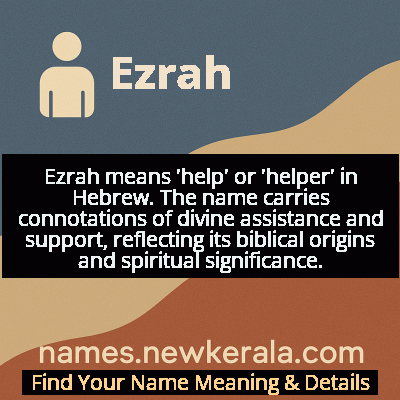Ezrah Name Meaning & Details
Origin, Popularity, Numerology Analysis & Name Meaning of Ezrah
Discover the origin, meaning, and cultural significance of the name EZRAH. Delve into its historical roots and explore the lasting impact it has had on communities and traditions.
Name
Ezrah
Gender
Male
Origin
Hebrew
Lucky Number
4
Meaning of the Name - Ezrah
Ezrah means 'help' or 'helper' in Hebrew. The name carries connotations of divine assistance and support, reflecting its biblical origins and spiritual significance.
Ezrah - Complete Numerology Analysis
Your Numerology Number
Based on Pythagorean Numerology System
Ruling Planet
Uranus (Rahu)
Positive Nature
Strong sense of order, loyal, practical, and disciplined.
Negative Traits
Stubborn, overly serious, rigid, and prone to feeling restricted.
Lucky Colours
Blue, gray.
Lucky Days
Saturday.
Lucky Stones
Blue sapphire.
Harmony Numbers
1, 7, 8.
Best Suited Professions
Managers, engineers, accountants, organizers.
What People Like About You
Dependability, discipline, practicality.
Famous People Named Ezrah
Ezra the Scribe
Jewish Priest and Scholar
Authored three biblical books and began compiling Hebrew scriptures that formed the Old Testament
Ezrah Cohen
Rabbi and Scholar
Prominent Talmudic scholar and community leader in Jerusalem
Ezrah Aharoni
Israeli Poet
Award-winning poet known for modern Hebrew verse exploring Jewish identity
Ezrah D. Patterson
Religious Leader
Influential community organizer and interfaith dialogue advocate
Name Variations & International Equivalents
Click on blue names to explore their detailed meanings. Gray names with will be available soon.
Cultural & Historical Significance
Throughout Jewish history, the name has been associated with religious leadership, textual scholarship, and community building, embodying the ideal of maintaining faith and tradition against overwhelming odds. In Islamic tradition, Ezra (known as Uzair) is also recognized as a righteous figure, though with different theological significance. The name's enduring cultural relevance stems from its connection to one of the pivotal moments in Jewish history—the return from exile and the reestablishment of religious practice based on written scripture rather than temple sacrifice alone.
Extended Personality Analysis
Individuals named Ezrah are typically perceived as thoughtful, intellectual, and deeply principled. They often exhibit strong analytical abilities and a natural inclination toward study and contemplation, reflecting the scholarly legacy of their biblical namesake. Ezrahs tend to be methodical in their approach to problems, valuing structure and tradition while also possessing the wisdom to adapt when necessary. Their personality often combines spiritual depth with practical wisdom, making them natural leaders in both religious and academic settings.
These individuals are usually reliable, conscientious, and take their responsibilities seriously, often being sought out for guidance and counsel. While they may appear reserved at first, Ezrahs typically have strong convictions and the courage to stand by their principles, even in challenging circumstances. They tend to be excellent listeners who carefully consider multiple perspectives before making decisions. The name suggests someone who balances respect for tradition with innovative thinking, much like the biblical Ezra who successfully navigated the tension between preserving ancient laws and adapting to new historical realities.
Modern Usage & Popularity
In contemporary times, Ezrah has experienced a modest revival as parents seek traditional Hebrew names with deep religious significance. While less common than its variant Ezra, which has seen substantial popularity in recent decades, Ezrah appeals to those looking for a more distinctive spelling while maintaining the name's historical and spiritual connections. The name is particularly popular within Jewish communities but has also gained some traction among non-Jewish parents attracted to biblical names. Its usage remains relatively rare, ranking outside the top 1000 names in most English-speaking countries, which adds to its appeal for parents seeking unique yet meaningful names. The name's association with scholarship and religious dedication continues to resonate in modern contexts, making it a choice that conveys both tradition and individuality.
Symbolic & Spiritual Meanings
Symbolically, Ezrah represents divine assistance, spiritual guidance, and the preservation of tradition. The name embodies the concept of being a helper or support system, both in practical and spiritual contexts. It symbolizes the bridge between ancient wisdom and contemporary application, reflecting Ezra's role in adapting Jewish law to new circumstances while maintaining core principles. The name also carries connotations of restoration and renewal, as Ezra helped rebuild Jewish religious life after the destruction of the First Temple. In a broader sense, Ezrah represents the power of written tradition, the importance of cultural memory, and the role of scholarly dedication in maintaining community identity across generations. It serves as a reminder that spiritual and cultural preservation often requires both reverence for the past and courage to face new challenges.

